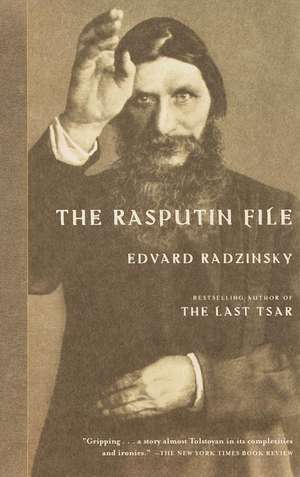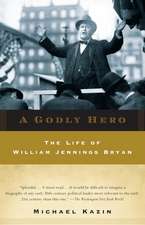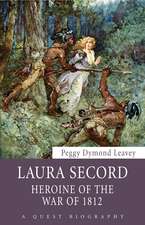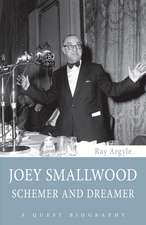The Rasputin File
Autor Edvard Radzinskyen Limba Engleză Paperback – 30 noi 2001
For almost a century, historians could only speculate about the role Grigory Rasputin played in the downfall of tsarist Russia. But in 1995 a lost file from the State Archives turned up, a file that contained the complete interrogations of Rasputin’s inner circle. With this extensive and explicit amplification of the historical record, Edvard Radzinsky has written a definitive biography, reconstructing in full the fascinating life of an improbable holy man who changed the course of Russian history.
Translated from the Russian by Judson Rosengrant.
Preț: 140.52 lei
Nou
Puncte Express: 211
Preț estimativ în valută:
26.89€ • 29.20$ • 22.59£
26.89€ • 29.20$ • 22.59£
Carte disponibilă
Livrare economică 02-16 aprilie
Preluare comenzi: 021 569.72.76
Specificații
ISBN-13: 9780385489102
ISBN-10: 0385489102
Pagini: 576
Ilustrații: 24 PAGES OF PHOTOGRAPHS; MAPS; GENEALOGY
Dimensiuni: 133 x 203 x 30 mm
Greutate: 0.53 kg
Ediția:Anchor Books.
Editura: Anchor Books
ISBN-10: 0385489102
Pagini: 576
Ilustrații: 24 PAGES OF PHOTOGRAPHS; MAPS; GENEALOGY
Dimensiuni: 133 x 203 x 30 mm
Greutate: 0.53 kg
Ediția:Anchor Books.
Editura: Anchor Books
Notă biografică
Edvard Radzinsky is the author of The Last Tsar and Stalin. A celebrated playwright and television personality, he lives in Russia.
Extras
1
THE FILE: SEARCHING FOR DOCUMENTS
The Prison Ball
I supposed that only when I had found the File would I be able to answer those questions. I had long been aware that the File had to exist.
In the 1970s when I was writing my book about Nicholas, I naturally had occasion to look at the papers of the Extraordinary Commission of the Provisional Government.
In March 1917, after Nicholas's abdication and the triumph of the February Revolution, the solitary confinement cells of the Peter and Paul Fortress became crowded. Delivered to that Russian Bastille, where during the tsar's reign political dissidents had been incarcerated, were the people who had put them there -- those who not long before had controlled Russia's destiny. The tsarist prime ministers Sturmer and Golitsyn; the minister of internal affairs Protopopov; the head of the infamous Department of Police Beletsky and his replacement Alexis Vasiliev; the aged court minister Count Fredericks; the chairman of the Council of State Schlegovitov; the palace castellan Voeikov; the tsarina's closest friend, Anya Vyrubova; and so forth and so on. In a word, the very highest society. So that the fortress's damp cells, constantly subject to flooding, resembled nothing so much as a brilliant Winter Palace ball.
On 4 March 1917, the Provisional Government formed the Extraordinary Commission of Inquiry for the Investigation of Illegal Acts by Ministers and Other Responsible Persons of the Tsarist Regime. And from the Peter and Paul Fortress the ministers were shunted back and forth for interrogation at the Winter Palace, so familiar to them, where the Extraordinary Commission worked, and where only recently they had appeared in medals and ribbons. Or else the Commission investigators would themselves drive out to conduct their interrogations at the fortress. The transcripts of those interrogations were then deciphered and put into shape. And it was Russia's leading poet, the famous Alexander Blok, who did the putting. He has described in his notebooks the atmosphere of the interrogations and the appearance of the Winter Palace with its empty throne room, 'where all the fabric had been torn from the walls and the throne removed, since the soldiers wanted to break it up'.
The transcripts of the interrogations were then prepared for publication. All Russia was supposed to learn, according the Commission plan, just what had transpired behind the scenes in mysterious Tsarskoe Selo, from which the tsar and tsarina had ruled Russia. On the basis of that information the future first Russian parliament was then meant to decide the fates of the tsar, the tsarina, and the ministers -- of those people who had just days before governed Russia.
And one of the main questions concerned the semi-literate Russian peasant Grigory Rasputin.
Section Thirteen
The Commission's executive council and its twenty-seven separate boards of inquiry conducted continuous interrogations of its brilliant prisoners from March 1917 until the Bolshevik coup in October.
A special board of inquiry with the expressive name 'Thirteenth Section' was particularly concerned with 'investigating the activity of the dark forces'. In the political jargon of the day, the 'dark forces' were Rasputin, the tsarina, and those close to them. The 'dark forces', their true influence via Rasputin over the former Tsar Nicholas II in the area of state governance: that was the substance of the Thirteenth Section's work.
The head of the Thirteenth Section was a certain F. P. Simpson, a former head of the Kharkov Provincial Appellate Court. The interrogations themselves were conducted by several investigators: two people with the same last name, Vladimir and Tikhon Rudnev, and Grigory Girchich. They, too, had been reassigned to the Commission from provincial courts. As a kind of guarantee that they would have no links to the capital's former governing clique now under investigation.
And then came the October 1917 coup. The Bolsheviks who seized power put an end to the Provisional Government. Those who the day before had been ministers in that government were sent to the very same cells in the Peter and Paul Fortress. Where not without humour they were greeted by the tsarist ministers whom they had only recently imprisoned in the same place. The Bolsheviks also put an end to the work of the Extraordinary Commission.
But in 1927 the Bolsheviks decided to publish part of the interrogations of the most important tsarist ministers, for the tenth anniversary of their revolution. The publication was supposed to be ideological; that is, it was supposed to demonstrate the 'senescence' of a tsarist regime controlled by the ignorant, debauched peasant Grigory Rasputin.
By that time, Alexander Blok, who worked on the stenographs, had died. The publication of the transcripts was supervised by one of the Extraordinary Commission's most celebrated members, P. Schyogolev, who had agreed to collaborate with the Bolsheviks.
Before the revolution Schyogolev had been editor of the magazine Times Past. A publication 'of wholly revolutionary temper', it had been shut down several times by the tsarist authorities. Leo Tolstoy said that 'if I had been young, I would have taken a revolver in each hand after reading Times Past.' For his magazine's sake he endured a cell in the Peter and Paul Fortress, where he himself would eventually interrogate the tsarist ministers who had imprisoned him. But after the Bolsheviks came to power, the once incorruptible Schyogolev changed completely. He became part of the Bolshevik regime. Evil tongues maintained that his apartment contained a collection of documents and furniture from the Winter Palace.
Seven little volumes entitled Proceedings of the Extraordinary Commission of Inquiry were all that Schyogolev published from the immense quantity of material produced by the interrogations. And those pitiful volumes were for many years the chief documentary basis for all the books written about Rasputin.
It was only four decades later -- in 1964 -- that another sensational document about Rasputin was added to those volumes drawn from the Extraordinary Commission's legacy. And it was after the appearance of that document that my search for the File began.
The Missing File
In 1964 the journal Issues of History published a sensational number that at the time was eagerly read not only by historians. Printed in it for the first time was the 'Resolution of the Investigator F. Simpson of the Extraordinary Commission Regarding the Activity of Rasputin and his Close Associates and their Influence over Nicholas II in the Area of State Governance', a document that until then had been held in a secret repository of the archive of the October Revolution.
The 'Resolution' was a summary of the Thirteenth Section's efforts to clarify Rasputin's role.
I read the issue later when I was starting work on my book about Nicholas II. And the 'Resolution' made a stunning impression on me. In his conclusion Simpson quoted extensively from the testimony of people belonging to Rasputin's most intimate circle: his publisher Filippov; his friend Sazonov, in whose apartment Rasputin had lived and with whose wife he had enjoyed the most intimate relationship; the famous Maria Golovina, a true worshipper of Rasputin who became an involuntary cause of his death; the Petersburg cocottes with whom Rasputin shared tender bonds; and the admirers who fell under his hypnotic influence.
Naturally, I at once started looking for that testimony in the Proceedings published by Schyogolev. And naturally I failed to find it there. For it was the testimony of people who had liked Rasputin. Their point of view was absolutely unacceptable to Schyogolev. And naturally he did not include what they had to say.
The quotations that Simpson had taken from the testimony for citation in his report actually changed things very little. For Simpson was trying very hard in his 'Resolution' to defend the same point of view advanced by Schyogolev in his publication.
The 'Resolution' sketched the same picture of a crude, debauched peasant rendered senseless by drunkenness and licentiousness who ruled both the royal family and those corrupt ministers who had agreed to serve him as the favourite.
Was it the whole truth of the testimony obtained by the Thirteenth Section? I had good reason to doubt it. For by then I already knew of the deep dissension within the Commission itself. One of the Thirteenth Section's principal investigators, Vladimir Rudnev, had even resigned in protest. After emigration, he wrote of his reasons: 'In August 1917, I submitted a request to be released from my duties in view of the attempts of the President of the Commission, Muravyov, to incite me to patently biased actions.'
And I resolved to attempt something very difficult for the times: to go to the archive myself and read the testimony that Simpson had quoted in such a biased fashion.
I won't recount the efforts that I made to assemble all the official papers required for the right to acquaint myself with the Extraordinary Commission's documents. Or how worthless those papers actually proved to be. Or how the only thing that did help was my status as a fashionable dramatist, as the author of plays whose productions were nearly impossible to get into at the time, and as the screenwriter of a film that was then enjoying immense success. Suffice it to say that I obtained access to the Extraordinary Commission archive.
How astonished I was to find there none of the testimony cited by Simpson! The documents were gone.
It was highly probable that those documents were the most interesting ones. They represented the testimony of people who had seen Rasputin daily. And of people who for some reason had agreed to serve him with devotion. There, perhaps, lay the solution to the riddle; there, perhaps, was hidden the authentic portrait of that mysterious person.
I called the vanished documents the 'File'. And straightaway began my search for the File.
The Writer Grigory Rasputin
I did find Rasputin's own rather pitiful file in the Commission archive.
First were his famous telegrams to the tsar and tsarina. Solicitously preserved by the latter right up to the revolution, they were confiscated by the Extraordinary Commission and widely disseminated in a variety of publications.
I also found certain mysterious and still unpublished telegrams sent from Tsarskoe Selo to Rasputin with the signature 'Darling' (Dushka). Those telegrams, which we shall come back to, shed a certain distinctive light on the relationship between Rasputin and the tsarina.
Also preserved in the archive were Rasputin's own works. The strongest and most puzzling of these, the 'Life of an Experienced Wanderer', was not published in his lifetime. But the other three were: 'Great Festivities in Kiev!' (it was during those festivities that the famous prime minister Stolypin was killed), 'Pious Meditations' (a collection of homilies), and 'My Thoughts and Reflections' (an account of Rasputin's trip to Jerusalem).
These particular documents were transcriptions: the semi-literate Rasputin spoke, and someone wrote down what he said. And wrote it down with affection.
After the revolution, Rasputin's published writings were all removed from the public libraries and transferred to closed repositories. It is hard to appreciate the charm of his books in translation. It is a special world, naive and beautiful, resembling the paintings of the Primitivists. His powerful and tender old-Russian speech unfortunately disappears in translation. It needs a poet to translate it well.
I can imagine the fascination experienced by those who listened to that speech, and who saw those piercing lupine eyes and the electric hands with which he would lightly touch his interlocutor while conversing.
Rasputin's Unpublished Diary
And then I found Rasputin's 'diary' in the archive. With the subheading, 'Written at his dictation. Kramer, L P.'
Rasputin's unpublished diary: it was as if all the characters of Schyogolev's Proceedings of the Extraordinary Commission had stepped down from its pages. And many of the stories in the diary, as well as the heroes of those stories, tallied with what I had read in the Proceedings! And yet . . . And yet the more I read of the diary, the more my enthusiasm waned. All that Bolshevik historical scholarship was trying to prove at the time -- the elder's debauchery, the venality of Petersburg high society, the pathetic stupidity of the tsar -- was contained in the diary.
Here is Rasputin instructing the tsar, 'pounding his fist', and explaining to the silly autocrat the enigma of the Russian people: 'How are you thinking of teaching the peasant? Through his ass? You want to tear his ass out, but such anger will grow in his head.' 'With tsars', Rasputin explains, 'you have to use the spirit, not reason . . . He doesn't understand reason but he's afraid of the spirit.' And here he is mastering the submissive tsarina: he has resolved to make peace with Germany, and the tsarina is reverently kneeling before him, promising to carry out his wishes. And then, of course, there is his incessant debauchery with the 'rotten aristocracy': 'Mama [the tsarina] drove me to Kusikha's [to the Baroness Kusova's] in Pavlovsk . . . The general's wife V. was there, too. The two of them stick to me like flies. She herself sticks to me and is always afraid someone will find out.'
It was obviously all a crude ideological forgery. It was not for nothing that in the subheading 'written at his dictation, someone had pencilled in the phrase, 'as if': 'as if written at his dictation.'
It is not, I think, very hard to identify the forgery's author. For the author (or authors) was already well known for another forgery that at the time had been spectacularly successful with its readers.
The 'Red Count' And The Spurious Diaries
In 1927, on the tenth anniversary of the fall of the tsar, the magazine The Past began the publication of 'Vyrubova's diary'. All Russia was besotted by the diary, which revealed secret and highly intimate details of the disintegration both of the royal family and of the regime that had recently governed the country.
True, rumours very soon began circulating that Vyrubova had had nothing whatever to do with its publication. Named as the authors of the diverting forgery were two well-known people: the publisher of the Proceedings of the Extraordinary Commission, P. Schyogolev, and the celebrated writer Count Alexei Tolstoy (the 'Red Count', as he was known in Moscow), an active Bolshevik collaborator.
Schyogolev and Tolstoy had already co-authored a play with very similar ideas: The Empress's Conspiracy, about Rasputin's attempt to carry out a palace revolution and install the tsarina as the country's leader. The play was wildly successful. It ran simultaneously in six of the largest theatres in Moscow and Leningrad.
And in 1927, on this tenth anniversary, it had evidently been impossible to carry out a powerful ideological campaign discrediting tsarism without the help of Schyogolev and the 'Red Count'. Nor could the campaign itself have been dispensed with; it was, in a phrase of the day, a 'social imperative'. Schyogolev, as the publisher of the Proceedings, obtained the material, whilst the count did the writing. Thus did the spurious Vyrubova 'diary' make its appearance. Its enormous success demanded that the work be continued. Rasputin's 'diary' was intended as a kind of sequel to Vyrubova's. And as in the creation of Vyrubova's 'diary' and The Empress's Conspiracy, Schyogolev provided the 'Red Count' with historical details from the published and, mainly, unpublished Proceedings. But thanks to the highly gregarious and frequently drunk 'Red Count', the story behind the Vyrubova forgery soon got out. There was no point in even thinking about publishing a second one, and the idea was abandoned. Schyogolev, who apparently had a taste for literary hoaxes, then turned Rasputin's 'diary' over to the archive. But by the 1930s the tsarist theme no longer interested the country. And so the diary was left to gather dust in the Commission archive.
THE FILE: SEARCHING FOR DOCUMENTS
The Prison Ball
I supposed that only when I had found the File would I be able to answer those questions. I had long been aware that the File had to exist.
In the 1970s when I was writing my book about Nicholas, I naturally had occasion to look at the papers of the Extraordinary Commission of the Provisional Government.
In March 1917, after Nicholas's abdication and the triumph of the February Revolution, the solitary confinement cells of the Peter and Paul Fortress became crowded. Delivered to that Russian Bastille, where during the tsar's reign political dissidents had been incarcerated, were the people who had put them there -- those who not long before had controlled Russia's destiny. The tsarist prime ministers Sturmer and Golitsyn; the minister of internal affairs Protopopov; the head of the infamous Department of Police Beletsky and his replacement Alexis Vasiliev; the aged court minister Count Fredericks; the chairman of the Council of State Schlegovitov; the palace castellan Voeikov; the tsarina's closest friend, Anya Vyrubova; and so forth and so on. In a word, the very highest society. So that the fortress's damp cells, constantly subject to flooding, resembled nothing so much as a brilliant Winter Palace ball.
On 4 March 1917, the Provisional Government formed the Extraordinary Commission of Inquiry for the Investigation of Illegal Acts by Ministers and Other Responsible Persons of the Tsarist Regime. And from the Peter and Paul Fortress the ministers were shunted back and forth for interrogation at the Winter Palace, so familiar to them, where the Extraordinary Commission worked, and where only recently they had appeared in medals and ribbons. Or else the Commission investigators would themselves drive out to conduct their interrogations at the fortress. The transcripts of those interrogations were then deciphered and put into shape. And it was Russia's leading poet, the famous Alexander Blok, who did the putting. He has described in his notebooks the atmosphere of the interrogations and the appearance of the Winter Palace with its empty throne room, 'where all the fabric had been torn from the walls and the throne removed, since the soldiers wanted to break it up'.
The transcripts of the interrogations were then prepared for publication. All Russia was supposed to learn, according the Commission plan, just what had transpired behind the scenes in mysterious Tsarskoe Selo, from which the tsar and tsarina had ruled Russia. On the basis of that information the future first Russian parliament was then meant to decide the fates of the tsar, the tsarina, and the ministers -- of those people who had just days before governed Russia.
And one of the main questions concerned the semi-literate Russian peasant Grigory Rasputin.
Section Thirteen
The Commission's executive council and its twenty-seven separate boards of inquiry conducted continuous interrogations of its brilliant prisoners from March 1917 until the Bolshevik coup in October.
A special board of inquiry with the expressive name 'Thirteenth Section' was particularly concerned with 'investigating the activity of the dark forces'. In the political jargon of the day, the 'dark forces' were Rasputin, the tsarina, and those close to them. The 'dark forces', their true influence via Rasputin over the former Tsar Nicholas II in the area of state governance: that was the substance of the Thirteenth Section's work.
The head of the Thirteenth Section was a certain F. P. Simpson, a former head of the Kharkov Provincial Appellate Court. The interrogations themselves were conducted by several investigators: two people with the same last name, Vladimir and Tikhon Rudnev, and Grigory Girchich. They, too, had been reassigned to the Commission from provincial courts. As a kind of guarantee that they would have no links to the capital's former governing clique now under investigation.
And then came the October 1917 coup. The Bolsheviks who seized power put an end to the Provisional Government. Those who the day before had been ministers in that government were sent to the very same cells in the Peter and Paul Fortress. Where not without humour they were greeted by the tsarist ministers whom they had only recently imprisoned in the same place. The Bolsheviks also put an end to the work of the Extraordinary Commission.
But in 1927 the Bolsheviks decided to publish part of the interrogations of the most important tsarist ministers, for the tenth anniversary of their revolution. The publication was supposed to be ideological; that is, it was supposed to demonstrate the 'senescence' of a tsarist regime controlled by the ignorant, debauched peasant Grigory Rasputin.
By that time, Alexander Blok, who worked on the stenographs, had died. The publication of the transcripts was supervised by one of the Extraordinary Commission's most celebrated members, P. Schyogolev, who had agreed to collaborate with the Bolsheviks.
Before the revolution Schyogolev had been editor of the magazine Times Past. A publication 'of wholly revolutionary temper', it had been shut down several times by the tsarist authorities. Leo Tolstoy said that 'if I had been young, I would have taken a revolver in each hand after reading Times Past.' For his magazine's sake he endured a cell in the Peter and Paul Fortress, where he himself would eventually interrogate the tsarist ministers who had imprisoned him. But after the Bolsheviks came to power, the once incorruptible Schyogolev changed completely. He became part of the Bolshevik regime. Evil tongues maintained that his apartment contained a collection of documents and furniture from the Winter Palace.
Seven little volumes entitled Proceedings of the Extraordinary Commission of Inquiry were all that Schyogolev published from the immense quantity of material produced by the interrogations. And those pitiful volumes were for many years the chief documentary basis for all the books written about Rasputin.
It was only four decades later -- in 1964 -- that another sensational document about Rasputin was added to those volumes drawn from the Extraordinary Commission's legacy. And it was after the appearance of that document that my search for the File began.
The Missing File
In 1964 the journal Issues of History published a sensational number that at the time was eagerly read not only by historians. Printed in it for the first time was the 'Resolution of the Investigator F. Simpson of the Extraordinary Commission Regarding the Activity of Rasputin and his Close Associates and their Influence over Nicholas II in the Area of State Governance', a document that until then had been held in a secret repository of the archive of the October Revolution.
The 'Resolution' was a summary of the Thirteenth Section's efforts to clarify Rasputin's role.
I read the issue later when I was starting work on my book about Nicholas II. And the 'Resolution' made a stunning impression on me. In his conclusion Simpson quoted extensively from the testimony of people belonging to Rasputin's most intimate circle: his publisher Filippov; his friend Sazonov, in whose apartment Rasputin had lived and with whose wife he had enjoyed the most intimate relationship; the famous Maria Golovina, a true worshipper of Rasputin who became an involuntary cause of his death; the Petersburg cocottes with whom Rasputin shared tender bonds; and the admirers who fell under his hypnotic influence.
Naturally, I at once started looking for that testimony in the Proceedings published by Schyogolev. And naturally I failed to find it there. For it was the testimony of people who had liked Rasputin. Their point of view was absolutely unacceptable to Schyogolev. And naturally he did not include what they had to say.
The quotations that Simpson had taken from the testimony for citation in his report actually changed things very little. For Simpson was trying very hard in his 'Resolution' to defend the same point of view advanced by Schyogolev in his publication.
The 'Resolution' sketched the same picture of a crude, debauched peasant rendered senseless by drunkenness and licentiousness who ruled both the royal family and those corrupt ministers who had agreed to serve him as the favourite.
Was it the whole truth of the testimony obtained by the Thirteenth Section? I had good reason to doubt it. For by then I already knew of the deep dissension within the Commission itself. One of the Thirteenth Section's principal investigators, Vladimir Rudnev, had even resigned in protest. After emigration, he wrote of his reasons: 'In August 1917, I submitted a request to be released from my duties in view of the attempts of the President of the Commission, Muravyov, to incite me to patently biased actions.'
And I resolved to attempt something very difficult for the times: to go to the archive myself and read the testimony that Simpson had quoted in such a biased fashion.
I won't recount the efforts that I made to assemble all the official papers required for the right to acquaint myself with the Extraordinary Commission's documents. Or how worthless those papers actually proved to be. Or how the only thing that did help was my status as a fashionable dramatist, as the author of plays whose productions were nearly impossible to get into at the time, and as the screenwriter of a film that was then enjoying immense success. Suffice it to say that I obtained access to the Extraordinary Commission archive.
How astonished I was to find there none of the testimony cited by Simpson! The documents were gone.
It was highly probable that those documents were the most interesting ones. They represented the testimony of people who had seen Rasputin daily. And of people who for some reason had agreed to serve him with devotion. There, perhaps, lay the solution to the riddle; there, perhaps, was hidden the authentic portrait of that mysterious person.
I called the vanished documents the 'File'. And straightaway began my search for the File.
The Writer Grigory Rasputin
I did find Rasputin's own rather pitiful file in the Commission archive.
First were his famous telegrams to the tsar and tsarina. Solicitously preserved by the latter right up to the revolution, they were confiscated by the Extraordinary Commission and widely disseminated in a variety of publications.
I also found certain mysterious and still unpublished telegrams sent from Tsarskoe Selo to Rasputin with the signature 'Darling' (Dushka). Those telegrams, which we shall come back to, shed a certain distinctive light on the relationship between Rasputin and the tsarina.
Also preserved in the archive were Rasputin's own works. The strongest and most puzzling of these, the 'Life of an Experienced Wanderer', was not published in his lifetime. But the other three were: 'Great Festivities in Kiev!' (it was during those festivities that the famous prime minister Stolypin was killed), 'Pious Meditations' (a collection of homilies), and 'My Thoughts and Reflections' (an account of Rasputin's trip to Jerusalem).
These particular documents were transcriptions: the semi-literate Rasputin spoke, and someone wrote down what he said. And wrote it down with affection.
After the revolution, Rasputin's published writings were all removed from the public libraries and transferred to closed repositories. It is hard to appreciate the charm of his books in translation. It is a special world, naive and beautiful, resembling the paintings of the Primitivists. His powerful and tender old-Russian speech unfortunately disappears in translation. It needs a poet to translate it well.
I can imagine the fascination experienced by those who listened to that speech, and who saw those piercing lupine eyes and the electric hands with which he would lightly touch his interlocutor while conversing.
Rasputin's Unpublished Diary
And then I found Rasputin's 'diary' in the archive. With the subheading, 'Written at his dictation. Kramer, L P.'
Rasputin's unpublished diary: it was as if all the characters of Schyogolev's Proceedings of the Extraordinary Commission had stepped down from its pages. And many of the stories in the diary, as well as the heroes of those stories, tallied with what I had read in the Proceedings! And yet . . . And yet the more I read of the diary, the more my enthusiasm waned. All that Bolshevik historical scholarship was trying to prove at the time -- the elder's debauchery, the venality of Petersburg high society, the pathetic stupidity of the tsar -- was contained in the diary.
Here is Rasputin instructing the tsar, 'pounding his fist', and explaining to the silly autocrat the enigma of the Russian people: 'How are you thinking of teaching the peasant? Through his ass? You want to tear his ass out, but such anger will grow in his head.' 'With tsars', Rasputin explains, 'you have to use the spirit, not reason . . . He doesn't understand reason but he's afraid of the spirit.' And here he is mastering the submissive tsarina: he has resolved to make peace with Germany, and the tsarina is reverently kneeling before him, promising to carry out his wishes. And then, of course, there is his incessant debauchery with the 'rotten aristocracy': 'Mama [the tsarina] drove me to Kusikha's [to the Baroness Kusova's] in Pavlovsk . . . The general's wife V. was there, too. The two of them stick to me like flies. She herself sticks to me and is always afraid someone will find out.'
It was obviously all a crude ideological forgery. It was not for nothing that in the subheading 'written at his dictation, someone had pencilled in the phrase, 'as if': 'as if written at his dictation.'
It is not, I think, very hard to identify the forgery's author. For the author (or authors) was already well known for another forgery that at the time had been spectacularly successful with its readers.
The 'Red Count' And The Spurious Diaries
In 1927, on the tenth anniversary of the fall of the tsar, the magazine The Past began the publication of 'Vyrubova's diary'. All Russia was besotted by the diary, which revealed secret and highly intimate details of the disintegration both of the royal family and of the regime that had recently governed the country.
True, rumours very soon began circulating that Vyrubova had had nothing whatever to do with its publication. Named as the authors of the diverting forgery were two well-known people: the publisher of the Proceedings of the Extraordinary Commission, P. Schyogolev, and the celebrated writer Count Alexei Tolstoy (the 'Red Count', as he was known in Moscow), an active Bolshevik collaborator.
Schyogolev and Tolstoy had already co-authored a play with very similar ideas: The Empress's Conspiracy, about Rasputin's attempt to carry out a palace revolution and install the tsarina as the country's leader. The play was wildly successful. It ran simultaneously in six of the largest theatres in Moscow and Leningrad.
And in 1927, on this tenth anniversary, it had evidently been impossible to carry out a powerful ideological campaign discrediting tsarism without the help of Schyogolev and the 'Red Count'. Nor could the campaign itself have been dispensed with; it was, in a phrase of the day, a 'social imperative'. Schyogolev, as the publisher of the Proceedings, obtained the material, whilst the count did the writing. Thus did the spurious Vyrubova 'diary' make its appearance. Its enormous success demanded that the work be continued. Rasputin's 'diary' was intended as a kind of sequel to Vyrubova's. And as in the creation of Vyrubova's 'diary' and The Empress's Conspiracy, Schyogolev provided the 'Red Count' with historical details from the published and, mainly, unpublished Proceedings. But thanks to the highly gregarious and frequently drunk 'Red Count', the story behind the Vyrubova forgery soon got out. There was no point in even thinking about publishing a second one, and the idea was abandoned. Schyogolev, who apparently had a taste for literary hoaxes, then turned Rasputin's 'diary' over to the archive. But by the 1930s the tsarist theme no longer interested the country. And so the diary was left to gather dust in the Commission archive.
Recenzii
“[G]ripping...a story almost Tolstoyan in its complexities and ironies.”–The New York Times Book Review
“[N]o reader can come away from [this] biography without a powerful impression of the charm and charisma of the semi-literate bearded peasant from Siberia.”–The Economist
“[N]o reader can come away from [this] biography without a powerful impression of the charm and charisma of the semi-literate bearded peasant from Siberia.”–The Economist
Descriere
Returning to the court of Nicholas II, the author of the bestselling "The Last Tsar" explores the mystery of Rasputin, one of the most fascinating and controversial persons of the 20th century. 30 photos.














